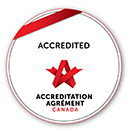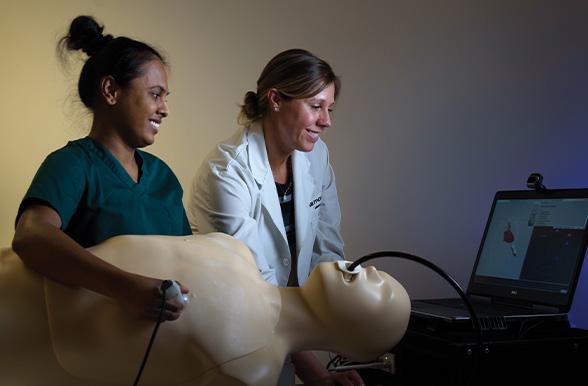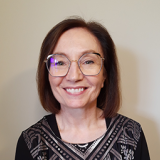Diagnostic Cardiac Sonography - 717
Overview
Program Highlights

- Nationally recognized and accredited program through Accreditation Canada EQUAL™.
- Develop field and clinical skills as part of an inter-professional team in the Centre for Health Care Simulation lab.
- Outcomes of the Diagnostic Cardiac Sonography program meet the competencies outlined in the Sonography Canada National Competency profile (NCP).
- The Diagnostic Cardiac Sonography program at Mohawk College is a College of Medical Radiation and Imaging Technologists of Ontario (CMRITO) approved educational program. Upon successful completion of the Diagnostic Cardiac Sonography program and registration with Sonography Canada, graduates are eligible to register with the CMRITO to obtain their license to work in Ontario.
- Learn about the functional requirements of the profession in the Additional Information tab.
- Mohawk’s Diagnostic Cardiac Sonography (DCS) Ontario College Graduate Certificate program is offered full-time with intakes in May and September.
What you will learn
- Develop theoretical and clinical competency in the field of cardiac sonography.
- Apply sonographic physics principles of safety and quality assurance to ensure the proper use of ultrasound waves for cardiac imaging.
- Apply critical thinking and problem-solving skills while imaging complex cardiac anatomy and assessing hemodynamics.
- Deliver safe and effective patient care and communication through best practice aligning with professional standards, code of ethics and legal requirements.
Explore Frequently Asked Questions.
Program length
54 weeks (4 semesters)
This is a fast-track program to be completed in 15 months of intense continuous study. The program includes 2 semesters of didactic courses and labs, followed by 2 semesters of clinical placements.
View the Exceptions Calendar for start dates and semester break information.
Important Academic Dates
Watch the Program Information Session Video
.
.
Admission
Admission
Equal Consideration Fall: February 1
Equal Consideration Spring: October 1
Academic Requirements
Applicants must possess one of the following qualifications:
- A Registered Diagnostic Medical Sonographer
A graduate of a two-year registered health professions diploma program with six credit hours in Human Anatomy and Physiology, or equivalent, and six more health care-related credit hours (i.e., ethics, psychology, patient care, medical research, etc).
Health professions include but are not limited to Medical Radiation Technologist, Respiratory Therapist, Registered Practical Nurse, Cardiovascular Technologist, Registered Massage Therapist, Occupational Therapist Assistant and Physiotherapist Assistant.
A graduate of a Bachelor’s or Master’s degree in a registered health professions program with six credit hours in Human Anatomy and Physiology, or equivalent, and six more health care-related hours (i.e., ethics, psychology, patient care, medical research, etc).
Degrees include but are not limited to BSc Kinesiology, BA Kinesiology, BSc Nursing, Bachelor of Medical Radiation Sciences, Bachelor of Health Sciences, Bachelor of Applied Health Sciences, MSc OT and MSc PT.
- Applicants that have not been active in their profession within the past 5 years are not eligible to apply to the program.
Mandatory Additional Selection Criteria
Résumé
A current résumé detailing duration and level of any patient care experience and names of courses and course codes requested under Admission Requirements section. Please use this resume template (downloads document, 23kb). The résumés must be sent to Ontario Colleges for submission.
Document Submission
- An official original transcript of all postsecondary education
- Request of transcripts are to be made via Ontario Colleges
- Résumé
-
A copy of current registration or license in your profession (not required for applicants who have not yet completed the 'Admission Requirements' that they are applying under)
-
Résumé and professional registrations and licenses can be submitted directly to Ontario Colleges. Please see more information on submitting your documents
Spring Applicant Document Submission Timelines
For applications for the Spring start, all required documents must be received by Ontario Colleges on or before January 31. Documentation received after January 31 will not be reviewed. Incomplete applications will not be reviewed.
Fall Applicant Document Submission Timelines
For applications for the Fall start, all required documents must be received by Ontario Colleges on or before February 16. Documentation received after February 16 will not be reviewed. Incomplete applications will not be reviewed.
Mandatory admission requirements for all applicants for whom English is a second language:
*applications without TOEFL/IELTS Academic results will not be scored
- TOEFL iBT score, completed within 2 years of application, of 98 (with a minimum score of 24 in each of reading, listening and writing and 26 in speaking)
OR - IELTS Academic score of 7.0 (with no band less than 6.5)
Applicants whose first language is not English will be required to demonstrate proficiency in English.
Tuition and Fees
Tuition and Fees
2024 - 2025 Domestic Tuition and Fees
| Description | Semester 1 | Semester 2 | Semester 3 |
|---|---|---|---|
| Compulsory Ancillary Fees | $832.02 | $785.16 | $613.12 |
| Co-op Fees | N/A | N/A | N/A |
| Compulsory Program Fees | $121.00 | $0.00 | $0.00 |
| Domestic Tuition | $2,007.11 | $2,007.11 | $1,720.37 |
| Total Domestic Charges Per Semester | $2,960.13 | $2,792.27 | $2,333.49 |
| Total 1st Year Fees | $8,085.89 | ||
Tuition and ancillary fees for semester 4 clinical are distinct from semester 3. You will be issued a fee statement for semester 4 that will reflect the expected tuition and fees for the second clinical placement.
Out of province domestic students may be subject to additional fees.
Above fees based on full-time September program start date. Contact Student Services to confirm fees for other start dates or semesters.
- Full Cost Breakdown
- Explore payment options
- Book costs for your program can be found through the McMaster Campus Store
- If your program includes a clinical, practicum, or field placement, you may be required to complete Preplacement Non-Academic Requirements (NARs). Full details will be provided in your classes. This is an additional cost (above tuition/ancillary fees and textbooks). More information can be found on the Preplacement Services webpage.
- You will also be required to purchase various supplies to fulfill your program requirements. Full details will be provided in your classes. This is an additional cost (above tuition/ancillary fees and textbooks).
Additional Information
Financial Assistance
Financial Assistance
When it comes to paying for your education, investing in your future can be more affordable than you think. A Mohawk education is one of the most cost-effective means of acquiring the skills and knowledge you need to have a prosperous and rewarding career.
As you start on your chosen career path, it's important to have a realistic set of expectations regarding the expenses associated with attending college. In addition to your tuition fees, you will also need to budget for books, supplies, housing, and other related living expenses. You may be able to supplement your income and savings with scholarships, bursaries, or loans. It pays to do some research into what types of financial assistance you may qualify for.
Available Financial Assistance Resources:
 OSAP Eligible. Learn about Ontario Student Assistance Program - OSAP (domestic students only)
OSAP Eligible. Learn about Ontario Student Assistance Program - OSAP (domestic students only)- Working on Campus
- Additional Sources of Funding
- Financial Assistance Home Page
Apply for Awards:
By submitting a Scholarships and Bursaries Application every semester, students have access to over $3 million in Mohawk College scholarships, bursaries and Ministry-partnered funding to help meet their financial needs.
Financial Literacy:
Whether saving for school, sticking to a budget, or planning for a major purchase, financial literacy affects us all. That's why Mohawk College is dedicated to helping students improve their financial literacy and become more confident in managing their money.
- Complete the free online Money Matters Module to earn Co-Curricular Credit!
- Financial Resources and Calculators
Program of Studies
Course Overview & Descriptions
Click on the course title for a course description.
Experiential Learning
Experiential Learning
How you'll gain skills
- On-site laboratory experience using high-fidelity simulation and state-of-the-art sonography equipment.
- Through practical, hands-on laboratory experience using state-of-the-art equipment.
- Participate in extensive unpaid clinical placements with affiliated clinical agencies.
To learn more, please visit the Centre for Experiential Learning.
Pre-Clinical Requirements
All accepted applicants are required to complete certain requirements prior to clinical placement and are responsible for the associated costs. Details about pre-placement requirements can be found on MyMohawk once accepted into the program. Please check the Preplacement Services on MyMohawk for details regarding deadlines.
To be eligible for field/clinical placement, you must not have been convicted of any offense for which you have not been pardoned. If your Police Check is 'not clear', your acceptance and suitability for placement is at the discretion of the agency. Mohawk College cannot guarantee placement changes if refused by the agency.
Clinical Placements
Clinical practice may be completed at a minimum of two clinical agencies that may be located throughout Ontario (e.g. Ottawa, Owen Sound, Windsor). The Program will determine the allocation of students to these sites. Clinical placements may occur at locations that are not accessible by public transit or may require the student to relocate. Students must prepare financially and personally to relocate and/or commute to their assigned clinical placement. Mohawk shall not be responsible for providing students with transportation to clinical placements. Students may be required to attend clinical practice in a site that is not of their choosing.
For more information regarding the Diagnostic Cardiac Sonography clinical placement, please contact christine.portwood [at] mohawkcollege.ca (subject: Clinical%20Placement%20Inquiry, body: Hello%20Christine%2C%0A%0A) (the clinical placement specialist).
Learning Outcomes
Learning Outcomes
Program Learning Outcomes, often referred to as ‘Program Standards', set out the essential learning that a student must achieve before being deemed ready to graduate.
In many cases these program learning outcomes were developed by the Ministry of Colleges and Universities (MCU) in consultation with employers and educators who are experts in the program field. To ensure the outcomes remain current and in line with industry needs, we invite our employers, graduates working in the field and current students to re-examine and update them during regular, ongoing program review focus groups.
Career Opportunities
Career Opportunities
Your future career options
- Diagnostic Medical Sonographer (DMS)
- Canadian Registered Cardiac Sonographers (CRCS)
- Registered Diagnostic Cardiac Sonographers (RDCS)
- Clinical Application Specialist
- Sonography Educator
Where you could work includes:
- Community and Teaching Hospitals
- Private Cardiology and Diagnostic Centres
- Medical Ultrasound Equipment and Software Application Companies
- Medical Research
Opportunities for grads
Professional Certification
Graduates of the DCS program are eligible to write the Cardiac Sonographer certification examination of Sonography Canada. Upon certification with Sonography Canada the sonographer may become a member of several professional associations dedicated to the promotion and development of the profession and the practice of sonography. However, all persons within the profession who wish to work in Ontario require registration by the College of Medical Radiation and Imaging Technologists of Ontario (CMRITO). Other provinces may also have their own registration or licensing processes.
Educational Pathways
Educational Pathways
Pathways to Mohawk
If you've successfully taken a course at another post-secondary institution, you may be able to earn course exemptions toward your credential here at Mohawk.
If you have successfully completed one of the following programs at Mohawk, you may be eligible to receive transfer credit in this program. To start a new program at Mohawk, you must apply via ontariocolleges.ca.
Transfer from
You can transfer to the Diagnostic Cardiac Sonography - 717 from the following programs:
Cardiovascular Technology
Medical Radiation Sciences
Receiving Program
Diagnostic Cardiac Sonography
Mohawk College makes every effort to ensure the accuracy of each transfer opportunity. Please note that changes may occur in program offerings, admission requirements, and transfer credits granted by the receiving institutions. We advise all students to check with the receiving institution directly for the most up-to-date information.
Don’t see what you’re looking for? Search ONTransfer.ca for more pathways with Ontario public colleges and universities.
Mohawk College makes no warranty or endorsement of material contained within links to external websites, nor does the College assume any responsibility for the linked website or its contents.
Additional Information
Additional Information
Functional Demands
The Diagnostic Medical Sonography health professions are intellectually, emotionally and physically demanding. It is important that applicants become familiar with the profession(s) before entering the program to be able to function at an acceptable standard. This demanding health care environment requires consideration for the following skills:
- Manual dexterity
- Physical strength for both patient and equipment movement
- Fine motor control
- Acute vision to view images and distinguish fine features in contrast and detail including nuances in colour Doppler ultrasound images
- Acute hearing to assess auditory Doppler ultrasound signals
- The ability to apply 3-D spatial relationships
- Both critical thinking and strong written/verbal commination skills
- Empathy when interacting with a diverse patient population
Learn more about the Medical Sonographers professions (NOC 32122)
Learn about the profession and role of a sonographer at Sonography Canada.
Skills courses
You may be required to act as simulated patients for your peers in skills course labs and during skills practice sessions.
Minimum technical and software requirements
Hardware
- Computer and Internet Connection
- You will need regular access to a Windows-based computer with an internet connection. Mac users will require Parallels software in order to run Windows software.
- High-speed broadband access (LAN, Cable or DSL) is highly recommended for the optimal learning experience.
- Some courses have more advanced system requirements.
Software
- Individual courses may have additional software requirements. This may include video or audio playing software or a specific software application.
- Most courses require word processing software.
- In some instances, it may be necessary for some users to upgrade their Flash or Java versions.
- Please ensure you are using an updated web browser such as Google Chrome, Safari, or Firefox, as most videos and resources are compatible with these.
- The following items may also be required for some courses:
- Speakers/headphones.
- Web camera and microphone.
- Virtual reality headset (do not purchase this unless instructed to do so)
Faculty
Program Coordinator
Contact Us
Contact us
Domestic Canadian Students
Contact Student Recruitment
Haven’t applied yet and have questions?
Contact our Student Recruitment team for information on programs, how to apply, and more.
Contact Admissions
Contact our Admissions advisors for help with your application.
Email Admissions
Book an Appointment ⤻
Phone: 1-844-767-6871
International Students
Contact International Student Recruitment
Contact our International Student Recruitment team for information on programs, how to apply, and student life.
Contact International
Email: intl.representatives@mohawkcollege.ca
Phone: 1-905-575-2254
Toll free phone numbers:
For general questions: 1-888-Mohawk9 (1-888-664-2959)
Contact International Admissions
Contact our Admissions advisors for help with your application.
Contact International Admissions
Phone: 1-905-575-2254
*Not all programs are international eligible. Please see our programs available for international students.
Accessible Learning Services
Are you a student with a confirmed or suspected disability? Visit our Accessible Learning Services website to discover how we can help you.
Program Coordinator
Discover the Institute for Applied Health Sciences at McMaster
The Institute for Applied Health Sciences (IAHS) is located in West Hamilton on the McMaster campus. The IAHS campus is where the majority (but not all) of our health programs are taught. Learn more about the IAHS:
We're here to help
We’re here for you to support applications and admissions by providing online and virtual service.
Applied and have questions?
The admissions team is available to help, you can contact them via Admissions or by phone at 1-844-767-6871.
Haven’t applied and need help?
Contact us or phone 1-844-767-6871.
Program delivery
Learn about program delivery terms.
Please note: in-person, virtual, and hybrid classes vary according to the program and some programs may be in-person only. Refer to the Program Overview for more information.







